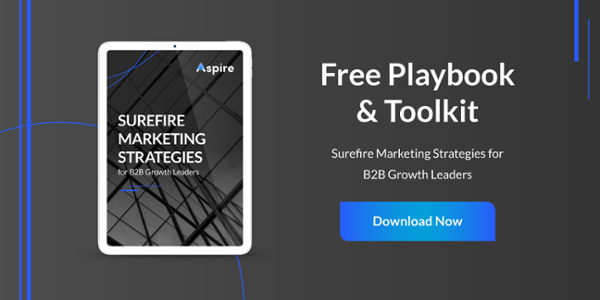
This article is the third of a six-part series exploring the key parts of The Framework from Aspire™.
In the digital age, search engines are paramount as customers increasingly rely on them to discover solutions and products that meet their needs. For B2B businesses, understanding the specific keywords that your target audience utilizes during their online research is vital. Keyword research not only drives organic traffic and boosts visibility but also ensures your offerings reach the right audience. This blog delves into the significance of keyword research in the context of your broader marketing plan or strategy.
Step 1: Adopt a Customer-Centric approach
Effective keyword research necessitates a customer-centric mindset from B2B businesses. It's crucial to understand your target audience’s challenges, pain points, and aspirations. By delving into their issues or questions, you can predict the keywords they are likely to use in their online searches.
Step 2: Identify Relevant Keywords
Once you've honed in on your target audience, pin down the relevant keywords. These are the words and phrases your potential customers use when seeking information or solutions related to your offerings. Compile a list of terms describing the features, benefits, or use-cases of your products or services.
Step 3: Leverage Resources and Tools for Research
Several tools and resources can aid you in pinpointing the most potent keywords. Keyword research tools like Google Keyword Planner or SEMrush provide insights on search volume, competition, and related keywords. Additionally, industry-specific forums, online communities, and social media platforms can reveal phrases and terms your target audience uses.
Step 4: Competitor Analysis
A glance at your competitors' keywords can offer invaluable insights. Analyze their web content, reports, and meta tags to detect their keywords. Such an analysis will help you understand the competitive landscape and might even uncover keyword opportunities your competitors have overlooked.
Step 5: Harness the Power of Long Tail Keywords
Alongside broad keywords, consider the strength of long-tail keywords. These are lengthier, more specific phrases with less search volume but higher intent. Users employing long-tail keywords are often closer to a purchase decision. By incorporating these in your content, you increase the likelihood of attracting relevant traffic and converting leads into customers.
Step 6: Content Creation and Optimization
The value of keyword research is realized when you incorporate it into your website and content. Optimize website pages, product descriptions, and articles with your identified keywords while maintaining a natural, reader-friendly flow. Leverage relevant keywords to craft high-quality, valuable content for your audience.
Step 7: Continued Monitoring and Refinement
Keyword research is not a one-time task but a continuous process. Monitor the performance of your chosen keywords and make necessary adjustments. Regularly update your content to stay relevant and keep an eye on evolving search trends. Be prepared to discover new keyword opportunities as your target audience's needs change.
Conclusion
For B2B businesses, keyword research can be a game-changer. It can boost online visibility, establish connections with customers seeking solutions, and draw in qualified traffic. By embracing a customer-centric approach, identifying relevant keywords, harnessing research tools, scrutinizing competitors, focusing on long-tail keywords, and optimizing your content, your business is set on the path to digital success.
However, remember that keyword research isn't a one-time event. To stay ahead of your competition and meet the evolving needs of your audience, it's essential to continuously monitor, adapt, and innovate. Watch as your B2B business ascends in search rankings, generates organic traffic, and converts leads into customers. Leveraging this understanding, The Framework from Aspire™, a 6-step approach, empowers B2B businesses to transcend "random acts of marketing" and adopt a strategic approach that delivers tangible results.
Aaron Marks is the Chief Marketing Officer of Execo. A digital pioneer with nearly two decades of online marketing experience, Aaron has helped organizations ranging from fledgling startups to Fortune 500 enterprises, and global manufacturers to U.S. Presidential campaigns, get the marketing and business results they needed.




0 Comments